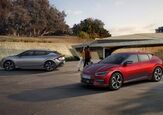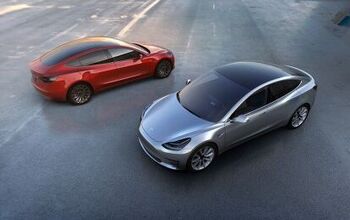Tesla Workers Are Attempting to Unionize Again

Employees at Tesla’s solar-panel factory in Buffalo, New York, are launching a drive to unionize with the International Brotherhood of Electrical Workers and the United Steelworkers. The campaign aims to unify about 300 production and maintenance employees at the the facility. If it succeeds, it will be the first time the automaker has failed to stop its staff from organizing inside the U.S.
The EV manufacturers’ labor force wants the same thing we all want — more money. Many claim that Tesla offers unfair wages and believe collective bargaining is the only road to higher pay.
According to Bloomberg, the two workers’ unions began hearing from Tesla employees earlier this year. “They want a fair wage that’s reflective of the state investment that the company received,” explained USW organizing coordinator Dave Wasiura.
Despite managing to prevent its American staff from organizing thus far, union talk persists at the company’s vehicle assembly plant in Fremont, California. Several former employees have accused Tesla of firing them for being union supporters and then claiming poor performance as the official cause of termination. Others have voiced safety concerns and poor working conditions, saying Tesla ignored the issue.
Elon Musk has a contentious relationship with labor unions. He pulled out every trick in the book to encourage his Californian team to snub the UAW over the past two years. He even went as far as accusing the UAW of engaging in “disingenuous” tactics and fear mongering while doing everything in his power to convince the media and his staff that the factory was a safe and enjoyable place of employment. He promised ice cream and a roller coaster, promised to undertake dangerous tasks himself to ensure their safety, and reminded employees that stock grants mean they make more than most employees at other auto plants.
From Bloomberg:
A Tesla spokesperson said that Tesla pays workers an average of $16.20 an hour and gives them benefits and an equity stake in the company. Tesla also pays performance bonuses, and said that the hourly wages are better than the average production worker makes in the Buffalo region.
“We offer wages and benefits that exceed those of other comparable manufacturing jobs in the region, and we recently increased our base pay even further,” Tesla said in a statement. “In addition, unlike other manufacturers, every single employee is an owner of Tesla, as everyone receives stock upon hire and for good performance, which results in significantly more compensation beyond our already high wages.”
Officially, Musk says he was “neutral” on the workforce organizing, and management’s alleged union-busting practices have proven notoriously difficult to prove. Meanwhile, employees in Buffalo have started gathering outside the factory this week to show the rest of the staff they are serious about launching an effort to unionize.

A staunch consumer advocate tracking industry trends and regulation. Before joining TTAC, Matt spent a decade working for marketing and research firms based in NYC. Clients included several of the world’s largest automakers, global tire brands, and aftermarket part suppliers. Dissatisfied with the corporate world and resentful of having to wear suits everyday, he pivoted to writing about cars. Since then, that man has become an ardent supporter of the right-to-repair movement, been interviewed on the auto industry by national radio broadcasts, driven more rental cars than anyone ever should, participated in amateur rallying events, and received the requisite minimum training as sanctioned by the SCCA. Handy with a wrench, Matt grew up surrounded by Detroit auto workers and managed to get a pizza delivery job before he was legally eligible. He later found himself driving box trucks through Manhattan, guaranteeing future sympathy for actual truckers. He continues to conduct research pertaining to the automotive sector as an independent contractor and has since moved back to his native Michigan, closer to where the cars are born. A contrarian, Matt claims to prefer understeer — stating that front and all-wheel drive vehicles cater best to his driving style.
More by Matt Posky
Latest Car Reviews
Read moreLatest Product Reviews
Read moreRecent Comments
- AZFelix This article takes me back to racing electric slot cars with friends on tracks laid out in the basement. Periodically your car would stop due to lost connections or from flying off the track and you would have to dash over to it and set it right. In the mean time your competitor would race ahead until faced with a similar problem. It seemed like you were struggling harder to keep from losing than trying to win. Fun times.“History never repeats itself, but it does often rhyme.” Mark Twain
- MaintenanceCosts What Americans get told (a) vs. actual EV ownership experience (b)(and, yes, I am an actual EV owner)a. You'll be waiting indefinitely for slow chargersb. Nearly all of your charging happens while you're at your housea. EVs are prohibitively expensive toys for the richb. Fuel cost is 1/4 that of gas and maintenance about the same, with purchase price differences falling quicklya. EVs catch fire all the timeb. Rates of ICE vehicles catching fire are much higher, although the few EV fires can be harder to extinguisha. You can't take a road tripb. Road trips are a bit slower, but entirely possible as an occasional thinga. iTz A gOlF cArT!!1b. Like a normal car, but with nicer power delivery and less noise
- Pete Skimmel We bought a last year 2015 model XB as a leftover new car at our local Toyota dealer in early 2016. Stupidly cheap at about $18,500 out the door (no sales tax in Oregon), it has an automatic and the usual amenities. It's been a great around town car that my wife hopes to keep until they pry her cold senile hands from the steering wheel in about 20 years. When we occasionally carry adult passengers in the back seat they are always in awe at the space in this smaller vehicle. Now approaching 49k miles on the clock, our out of pocket costs have been wiper blades, a set of decent tires and routine oil changes that I do in the garage. It consumes zero oil between changes. Yes, it's an appliance, but a very serviceable one.
- Slavuta "The 4,861-pound curb weight" -- poor tires"on track, this application sounded pretty good" -- can they make it sound like Hemi?
- Slavuta Next time Poland will get to assemble Senior.BTW, reported today - companies leaving Poland, and not only IT

































Comments
Join the conversation
If Tesla's compensation isn't competitive, how did the employees end up working for Tesla?
Only a fool would open a business in New York. Musk had to have seen this coming.